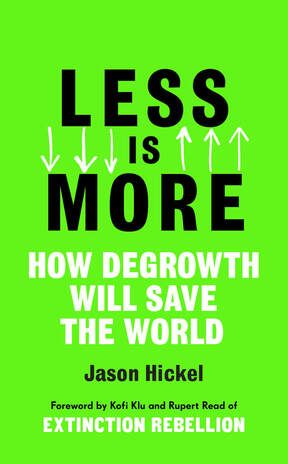Less is More: How Degrowth Will Save the World
According to the degrowth movement, a global economy that uses less materials and energy, respects ecological boundaries and thrives, is possible. Jason Hickel, argues that we must share what we have fairly, organize our economy in balance with nature, and abolish our obsession with economic growth

Review by Bram van de Glind
Published by Cornerstone, 2020
The discussion around the desirability versus the harm of economic growth has flared up again in recent years. But the discussion is not new at all. Nearly fifty years ago, the Club of Rome published the Limits to Growth report, warning of the harmful effects of endless growth. However, the predicted shortages of raw materials and food do not really seem to have materialised. Because of this, growth remained the mantra in the decades that followed. But since the climate and biodiversity crises has moved higher up on the political and public agenda, the criticism of growth is growing again. Growth critics no longer fear shortages of raw materials or food, but the prospects of an uninhabitable planet.
In 2017, Kate Raworth's ‘Doughnut Economics’ was one of the first popular science books with a clear growth-critique that reached a wider audience. Two years later, more than 11,000 scientists signed a statement calling for GDP growth to be rejected as an economic goal. In the same year, Greta Thunberg spoke in her famous speech at the United Nations of "fairy-tales of eternal economic growth." It is clear that growth criticism is increasingly embraced within the environmental movement.
And yet a political turnaround is not happening. The apparently green ambitions of the European Commission appear to be caught in growth thinking. According to the Commission, the European Green Deal should reduce greenhouse gas emissions, but also generate economic growth.
Degrowth
The degrowth movement argues that the obsession with growth is the main cause of today's environmental problems and is incompatible with planetary boundaries. Rich countries such as the Netherlands and the UK should degrow and reduce their raw materials and energy consumption. But how do we ensure that this actually happens and that everyone can still lead a decent life? And what does it mean to organize our economy in balance with nature? These are the core questions that the degrowth movement has been studying.
What started with a single conference in Paris in 2008 is now a full-fledged academic discipline and social movement. In hundreds of scientific publications, and at many conferences and meetings, the movement explores what a thriving society without growth can look like. Hickel's book Less is More is an accessible introduction to this topic, with concrete proposals for how things should be done differently.
Growth and resources
In times of COVID-19, almost everyone understands the extraordinary power of exponential growth. Figures for global economic growth may be low, at around three percent a year, but this still means a doubling of the economy in twenty-four years, and a quadrupling in 48 years. In 2100, the economy would be eight times bigger compared to today’s. Since raw materials and energy consumption are historically strongly linked to economic growth, this will most likely also mean eight times as much raw materials extraction and energy consumption in 2100. Even though we are currently already using more raw materials than the earth can handle. This is madness, in Hickel's view.
According to Hickel, a flourishing society without growth is certainly possible. But not in the current growth-based system, in which a year without growth means a recession, and leads to unemployment and poverty. If we apply our minds to carefully changing society, it must be possible to flourish with an economy that produces less.
Fair sharing
But what is a flourishing society? Hickel does not give a concrete definition, but he points out some important features. Fair sharing of raw materials, work and income are key according to him. To distribute resources more fairly, rich countries must set a limit on resource and energy consumption, and gradually tighten this limit so that relatively poor countries can grow to raise their welfare levels.
Hickel asks rich countries to produce and consume less. First, we need to scale down environmentally harmful industries such as the oil, beef and aviation industries in a fair way. In addition, we must prohibit planned obsolescence of products. Products such as electrical appliances, furniture and clothes are often designed in such a way that products won’t last long and need replacement relatively quickly. This may be good for economic growth, but it is harmful for our planet - and thus planned obsolescence should be banned. Advertising should be cut as well. According to Hickel, advertisements fuel unnecessary consumption and do not contribute to well-being.
But what are the consequences of producing less and consuming less, for work and for incomes? Here too, we must share fairly according to Hickel, for example by implementing a four-day working week. An additional benefit of this is that people have more time to perform other important activities that do not count in GDP, such as caring for a sick person or raising children.
Income should also be distributed more fairly, for example by limiting the difference between the highest paid and the lowest paid in an organization. In the most extreme cases, a CEO now earns 3,000 times as much as the lowest paid employee. Hickel says, we should make it legally binding that this difference may not exceed a factor of ten within each organisation.
Clearly, degrowing goes much further than simply replacing GDP with alternative indicators for wellbeing. The proposals mentioned in this review represent only a selection of the many ideas in Less is More. The strength of the book is that Hickel not only analyses problems, but also offers hope for the future with a clear vision. This book is a must read for anyone looking for concrete alternatives to economic growth.



